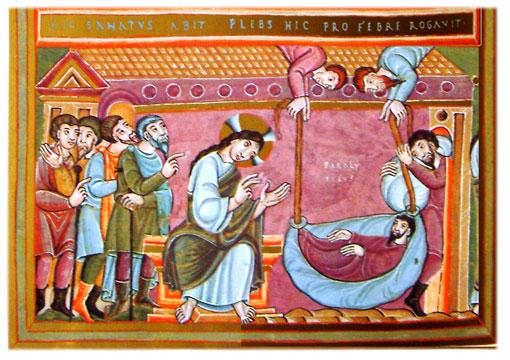Sometime during listening to Catholic radio archives discussing families, college kids, and the issues of the day, I thought it worthwhile to take a theological look at the question: Can virginity be restored?
Here's the short answer: If given in marriage, no. If given outside of marriage, yes.
Now, an event in history cannot be changed. But in the context of this analysis, the physical actions are not the ultimate focus. In Catholic teaching, the sexual faculties and the giving of the self in that way to another is something which belongs within the institution of marriage. From the Catechism:
Sexuality is ordered to the conjugal love of man and woman. (CCC#2360) The acts in marriage by which the intimate and chaste union of the spouses takes place are noble and honorable; the truly human performance of these acts fosters the self-giving they signify and enriches the spouses in joy and gratitude. (CCC#2362) [S]pouses share in the creative power and fatherhood of God. (CCC#2367)The sacrament of marriage is seen as the image of Christ as bridegroom wedded to his only bride, the Church (Theology of the Body 91, et al).
In other words, the gifts of our gender and sexuality are properly exercised within marriage. In so doing, the spouses express gratitude to the Creator who gave the gifts. Thus, virginity given in marriage does not cause any spiritual damage to the involved spouses. Such giving of virginity cannot be "repaired" or "restored" because no damage occurred in its giving.
The loss of virginity outside of marriage is a different story. Because it involves the use of the sexual faculties in a way reserved for marriage, damage is caused to the soul. Sin takes place. It is in this sense that the virginity lost can be restored. And it is only this sense that is of ultimate consequence.
This involves the heart of the Gospel message:
The Gospel is the revelation in Jesus Christ of God's mercy to sinners. The angel announced to Joseph: "You shall call his name Jesus, for he will save his people from their sins." (CCC#1846)In his earthly ministry, Christ breathed on the Apostles and said, "If you forgive the sins of any, they are forgiven; if you retain the sins of any, they are retained." (John 20:23) Many Catholic apologetic articles can be found on this subject (e.g. here or here), but suffice it to say, this is an important passage in understanding that Christ installed the sacrament of reconciliation (aka penance, confession). Christ exercises his forgiveness through the priest.
So the crux of this essay is this: The giving of virginity in a sinful way causes damage that can be repaired by Jesus Christ who gave the Church the healing sacrament of reconciliation.
Think of what happens when someone incurs an injury, say a broken bone. Doctors can reset this bone such that it heals and restores the bone to its original status and strength. Sin likewise causes damage to the soul. It is Christ who repairs this damage.
Healing of the Paralytic, Codex Egberti
ANALOGY OF THE HEALING OF THE PARALYTIC
The figure of physical healing as the sign of spiritual healing is evident in Scripture. For example, in Mark 2, there is the story of the paralytic lowered through the ceiling. Jesus tells the paralytic, "My son, your sins are forgiven." The scribes there are disturbed and question who but God can forgive sins. Jesus then gives them the physical sign that he has the power to forgive sins which cannot be seen with the eyes. He says to the scribes, "But that you may know that the Son of man has authority on earth to forgive sins" and then he says to the paralytic, "I say to you, rise, take up your pallet and go home." The paralytic rises and walks.
Jesus juxtaposes the physical healing with the forgiveness of sins. Christ removed the man's physical affliction so that the audience would believe he removed the man's spiritual affliction. This is why if one illicitly loses one's virginity, one should know that this can be restored by Christ in the sacrament of reconciliation.
Here are a couple more Church references demonstrating this teaching:
The whole power of the sacrament of [reconciliation] consists in restoring us to God's grace and joining us with him in an intimate friendship. (CCC#1468)And so, the Church, operating by the power of Christ, offers those authentically approaching the sacrament of reconciliation true healing of their sin, be it a loss of virginity outside of marriage or any sin. A soul can be restored to a newness, a "former splendor," as if the sin had never occurred. In the spiritual sense, which is the only one of eternal consequence, the soul having sinfully forfeited his or her virginity has recovered grace lost. The damage is repaired. As in the story of the paralytic, the affliction on the person is removed. Gone. The the true penitent receiving the sacrament is united to God destined to dine at the eternal banquet in heaven.
[W]ell may those sinners who have stained the white robe of their sacred baptism fear the just punishments of God. Their remedy is "to wash their robes in the blood of the Lamb"—to restore themselves to their former splendor in the sacrament of Penance. (Pope John XXIII, Paenitentiam Agere, 14)


No comments:
Post a Comment